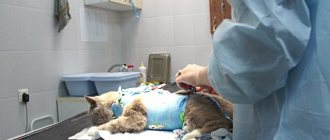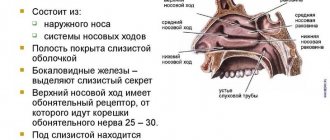A cat is a true, sensitive, loyal and unobtrusive friend. But she needs care like no one else. One of the manifestations of the owner’s love is caring for the health of the ward. Despite the active promotion of proper cat care, there are still owners who believe that the operation will make their pet unhappy as a man, will deprive life of meaning, and is generally very painful and dangerous.
Should a cat be neutered?
Should I castrate my cat? Veterinarian advice: to castrate or not to castrate a domestic cat
If a cat lives at home and is of no value as a producer and will not produce purebred offspring, then the answer from veterinarians is yes, castrate. This will make life much easier for both the animal itself and its owners, who have already learned all the delights of growing up a furry ward:
- loud “songs” during the rut (which will begin approximately six months after birth);
- “tags” of surrounding objects is a mandatory process that instinct requires from any sexually mature individual. Persuasion, punishment and even all sorts of repellent sprays like “Antigadin” will not achieve anything here. Having stopped marking in one corner, the cat compensates for this in another.
- improved health;
- increasing the lifespan of a cat. It has now been proven that cats deprived of male dignity live on average 2-3 years longer than their “full-fledged” counterparts.
Neutering will make your cat's life much easier.
Attention! Castration should not be confused with sterilization. In the first case, the testicles are cut out, in the second they remain in place, the veterinarian ties the spermatic cords. The latter will cut off the possibility of paternity, but will not cancel the rut and its manifestations.
Castration: pros and cons
Whether to castrate a cat or not depends on the will of the owner of the animal. The operation may not be necessary if the pet has the opportunity to go for free walks outside. This will allow him to release accumulated sexual energy and aggression. But this option also has its pitfalls, because on the street a cat can meet an equally “preoccupied” male and then a fight is inevitable. During such a confrontation, the animal may suffer physical harm.
Housing a sexually mature, uncastrated individual is fraught with many problems. Therefore, many cat owners resort to forced measures to deplete them.
Brief information: surgical castration of animals is a surgical intervention, the purpose of which is to suppress libido (sexual desire) and eliminate the reproductive instinct. During the operation, the testes are removed under general anesthesia. As a result, hormonal levels change and testosterone ceases to be produced.
Important: the terms “castration” and “sterilization” should not be confused. In the first case, the testicles are cut out, and in the second, the spermatic cords are tied up, which makes it impossible to conceive offspring, but does not cancel all manifestations of sexual desire.
Let's analyze all the pros and cons of castration of cats.
Arguments in favor of surgical intervention:
- the cat becomes healthier due to the fact that nervousness due to unsatisfied sexual instinct disappears;
- the likelihood of escapes decreases, the male does not have an uncontrollable desire to go out the window of a multi-story building in search of a female;
- there is no desire to leave marks of one’s territory;
- the risk of diseases caused by forced sexual abstinence is minimized. For example, a prostate tumor, prostatitis, adenoma of the perianal (located near the anus) glands. Important: special studies have proven that infertility in cats reduces the likelihood of testicular cancer by 75%;
- the risk of contracting infectious diseases due to close contact with homeless street animals is reduced;
- Life expectancy increases by 1.5 - 2 years. This occurs due to a reduction in the incidence rate and a decrease in metabolic rate;
- the cat's character becomes softer;
- all other instincts are not violated. The animal continues to hunt and play;
- The number of stray kittens is not increasing.
These were the arguments for castration, now let’s look at the arguments against the operation:
- the reluctance of the pet owner to interfere with the natural course of events;
- small population of a particular breed;
- the fragile health of some artificially bred breeds;
- the possibility of obesity due to poor nutrition due to a decrease in metabolic rate;
- potential prospect of obstruction of the urethra with sand due to the occurrence of urolithiasis;
- the animal has chronic diseases in the acute stage;
- general weakness of the body;
- intolerance to anesthetics;
- The cat is over 8 years old.
How to prepare a cat for castration?
It is advisable to operate before the male has time to mate. After mating, the cat will still have some desire to communicate with females, which means that the troubles associated with this will sometimes appear.
Before the intervention, the cat is not fed, you can only give it something to drink. But remember that at least twelve hours must pass from the last snack to being placed on the operating table. Last drink - no later than three hours before. Before going into anesthesia, it is important to be present to calm the furry and not make him nervous again. The procedure will take approximately half an hour. The animal will not experience pain or discomfort; it will be under anesthesia.
The last meal should be taken no later than 12 hours before surgery
Important! A complete examination is required before surgery. This includes general and biochemical blood tests, checking for hidden infectious foci. It is also necessary to visit a cardiologist to completely eliminate possible complications during anesthesia.
Is it harmful to have surgery?
Sterilizing your pet will help get rid of the following problems:
- unpleasant smell (the cat will stop marking the territory);
- plaintive meowing (the pet will stop demanding the cat);
- The cat's aggressiveness will disappear.
Neutered cats, according to statistics, live several years longer than regular pets. In sterilized pets, the risk of cancer is also reduced.
The disadvantages of this type of surgical intervention include a difficult postoperative period. The administration of anesthesia negatively affects the health of the pet. There is a risk of suture inflammation and bleeding. Before the operation, the veterinarian is required to conduct a series of tests, since sterilizing an unhealthy pet is strictly prohibited. When the operation is performed by an experienced veterinarian, the risk of complications is reduced to almost zero.
After surgery, cats begin to rapidly gain weight due to high food consumption. The weight of a castrated cat can reach 12 kg. In order to prevent such problems, most veterinarians recommend switching your pet after surgery to specialized food for neutered cats. There should be no restrictions on drinking, otherwise the animal may develop urolithiasis.
When is the best time to castrate a cat?
Veterinarians do not approve strict age limits. The main thing is that the male is not too young, that is, before puberty, and not too old. Seven months to seven years is best.
The characteristics of the breed must also be taken into account. Some breeds of cats mature significantly later than others. It is better not to use anti-rut medications - firstly, they have serious side effects, including cancer. Secondly, the problem cannot be solved with tablets and drops. The cat will continue to mark and rush outside, calling out females with screams, so the question of castration will still arise in full force after some time.
It is best to perform the operation from seven months to seven years
Unneutered cat: possible problems
Perhaps in the first year of your cat’s life the question of whether to castrate him will not arise urgently, but with the arrival of the first spring you will increasingly begin to think about this question. Most often, cats that are rarely outside, whether voluntarily or at the whim of their owners, begin to mark their territory . Most often, pets don’t even care where to do it. Both ordinary slippers and an expensive sofa can be completely damaged.
It is noteworthy that cats, unlike cats, are more intrusive in their desires. Thus, a caring owner, seeing how his pet is suffering, will most likely offer the cat:
- go outside and find a cat there yourself;
- bring a couple into the house or send them on a date.
In the case when the first option does not work, the second also may not always fully satisfy you. Often, it is not enough for cats to enjoy one meeting, and they continue to behave indecently . In addition, in most cases, in addition to marking territory, animals vocalize songs loudly. It is at such moments that the question of whether an animal should be castrated becomes especially acute.
This is interesting: How to care for a cat after castration
Postoperative care for a neutered cat
Any operation is always stressful. After it, you need to make sure that nothing prevents the animal from resting after such a shock. Ideally, it is better to place the cat in a corner in advance where no one will disturb him. In the first hours after the intervention, it is necessary that one of the owners be next to the operated patient while the animal recovers from anesthesia. Having more or less come to his senses, the patient will rush to lick his wound, or try to climb somewhere higher. Neither one nor the other should be allowed.
The cat needs to be provided with a warm and calm place.
Doctors usually recommend treating the incision site with hydrogen peroxide. Complications after manipulation are extremely rare, so there is no reason to worry, but if alarming signs appear, it is best to inform a doctor and ask him for advice.
When the dope ends, the pet will want to eat. You can give him special diet food and plenty of water (and not only after anesthesia, but always in general). Under no circumstances should veterinary cat food be mixed with offal, meat or scraps from the owner’s table!
The cat should be fed with special dietary food (it is best to check with your veterinarian)
It is important to understand that after the intervention the pet will behave unpredictably for some time. Some cats behave as if nothing had happened within a few days, while others become lethargic and prefer to lie down. The culprit is psychological discomfort.
This is one of the reasons why you should not castrate free-ranging cats. Habits will not go away, whether there was an operation or not. In the postoperative period, the animal will be immobilized and completely helpless; there is a high risk of getting an infection. And in the future, a street cat will also have problems communicating with its own kind.
How to feed a neutered cat
When to have surgery?
- There is a rule of two sevens - from 7 months to 7 years.
So, from 7 months you can already have surgery, with the exception of representatives of strange, “synthesized” breeds in which puberty is delayed.
But we, for example, still hoped not to interfere in the cat’s personal life until signs of sexual desire began to appear. Until the very end, we believed that we could cope with drops and pills that relieve anxiety. However, this did not help.
Photo: rihaij, pixabay.com
- Important! It is advisable to castrate the cat before mating .
By the way, we didn’t know this right away, and even the veterinarians didn’t warn us about it. And now our cat (everything worked out with his cat, and one kitten was the spitting image of our Mussolini) periodically has a desire, less pronounced, but it has not disappeared completely.
As it turned out, the production of male sex hormones is carried out by the pituitary gland (this was explained to us later), but no one removed it. In general, the cat remembers how it happened and wants a repeat.
Will a castrated cat suffer without the opportunity to mate?
There is a widespread opinion among animal owners, especially men, that castrating a cat is the same as humiliating him, depriving him of the meaning of life, and committing unheard-of cruelty. It is a myth. If we speak in terms of feelings, then the cat will only be glad to get rid of a constant source of stress and danger. We must not forget that during the rutting season, individuals’ sense of danger and self-preservation instinct are greatly dulled. This is where the desire to rush out of a window from a high floor comes from, even if the cat previously felt danger and stayed away from the windows. You cannot humanize the beast: reproduction and communication with cats is not the meaning of life for him, but the realization of his sexual instinct. You should not attribute love of children to the animal, saying that the veterinarian will deprive him of the opportunity to have a family. If this were so, cats would not seek to destroy the litter of a female who has barely given birth!
Why spay and neuter your pets?
And the suffering within four walls, where there is no opportunity to meet pussies, will only be stronger.
More details about the importance of the procedure can be seen in the video.
Video - Castration of cats. What does the owner need to know?
Is it harmful?
It is widely believed that removal of the testes is harmful, dangerous to health and life, and provokes many incurable diseases, including cancer. If you analyze in detail and delve into the medical aspect, it will become clear that these fantasies are completely unfounded.
Methods of castration
Of course, the intervention will not leave its mark on the body. The following consequences are undoubted:
- Restructuring of hormonal levels.
- General decrease in motor activity.
- Increased appetite.
- Increased risk of gaining excess weight.
It is the last three factors that are especially serious in terms of the risk of developing urolithiasis. From the moment you recover from anesthesia until the end of your life, the cat will have to follow a diet. Overeating and eating cheap, low-quality food with flavoring additives is unacceptable. This is the only way to keep your pet safe. Also, the risk of developing urolithiasis increases if a male is castrated too early - before seven months.
After castration, you need to carefully monitor your cat's diet.
Why is the procedure needed?
Castration of cats is accompanied by the removal of reproductive organs (testes), in which the main male hormones (responsible for behavior) are produced and the process of formation of germ cells (spermatogenesis) occurs.
That is, you need to castrate a cat in the following cases:
- if there are no plans to have offspring (especially important for cats walking outside or going to the country);
- damage to property in the house (leaving marks with urine), often for this reason cats are thrown out or euthanized;
- extreme aggression of the cat towards people and other cats in the house (the operation will make him a little calmer);
- when keeping a large number of pets in a crowded environment, in order to correct behavior in the group and prevent conflict situations (in circuses, shelters, pet cafes).
- for medical indications (development of cancer, genetic abnormalities, incurable viral diseases, injuries in cats).
Veterinarians and volunteers also recommend castration for abandoned cats that are in foster care while searching for a new family (such animals are more readily adopted from shelters as adults).
If the owner prefers not to castrate the cat, then it is worth taking care of finding a suitable pair and providing the cat with comfortable living conditions, taking into account its behavior (it is possible to use pheromones to calm it down).
Advantages of castration of male cats
There are many pros and cons of performing the operation in each specific case. The positive aspects in favor of the decision to “castrate the cat” are:
- increasing the life expectancy of a pet (castration has been proven to increase a cat’s life expectancy by an average of 2-4 years due to a reduced risk of developing sexually transmitted infections);
- calming violent and characteristic cats (the aggressor, of course, will not turn into a good-natured plush, but will become less excitable);
- the specific cat smell will disappear in the house (neutered cats have less persistent and odorous urine);
- if a genetic defect of the manufacturer is identified (a breeding cat was bred, but kittens were born from it with a defect in health or phenotype);
- you will not need to constantly buy hormonal contraceptives for your cat (they often cause the development of neoplasms).
Cons of the operation
If the pet owner doubts whether it is necessary to castrate a cat and does not know what this procedure entails, here is an explanation:
- cats castrated at an early age grow smaller (in this case, muscle mass and physical strength are meant) because testosterone production stops;
- cats of a rare breed with excellent qualities after the operation will no longer be able to take part in breeding;
- A cat can gain excess weight if its diet is not revised (neuters need to reduce the caloric content of food by 25%).
Important! After the operation, the cat’s hormonal levels will be adjusted within 1-2 months. It is during this period that old habits may appear as before, but gradually fade away. Therefore, pet owners should not expect that 2-3 days after castration the cat will stop marking or meowing loudly.
A castrated cat is deprived of an important aspect of his life.
As already mentioned, intimate encounters among animals are dictated only by instincts. Cats don't need marriages.
The most ardent supporters of the identity of feline and human experiences decide that if you buy a girlfriend for your pet, you can forget about the procedure. The approach is incorrect and naive. Firstly, the most serious question is what to do with the offspring? No sane, loving owner would allow himself to drown, and the problem of giving away kittens is not always easy to solve. Secondly, a cat’s sexual appetite requires satisfaction sometimes up to several times a day. And if you remember what wild screaming and howling are accompanied by intimate meetings with cats, you can imagine what kind of “peace” awaits the inhabitants of the apartment.
Castration of a cat
A castrated cat will get urolithiasis
You can hear fears about urolithiasis everywhere. Many cat owners are convinced that an operated animal will definitely get sick. Not everything is clear here. Castration itself does not lead to urolithiasis. KSD occurs if the cat drinks sparingly, eats the wrong foods and is often susceptible to infectious diseases.
After the intervention, metabolism undergoes a restructuring. Normally, the menu of an operated animal contains as little protein and mineral components as possible. This is why there are dietary foods without salt or flavoring additives.
Symptoms of urolithiasis in a cat
Any “goodies” rich in calcium, phosphorus or magnesium are prohibited, especially fish products. Let the cat drink a lot (the daily drinking requirement is 60–80 ml per 1 kilo of body weight). Also, a neutered pet has an excellent appetite and begs for supplements. But you cannot follow his lead: it is very easy to disrupt your metabolism and the consequences in the form of obesity and the formation of deposits are guaranteed.
Disadvantages of castration
Most often, the disadvantages of the procedure are associated with the administration of anesthesia, to which the animal can react in the most unpredictable way. An operation performed in adulthood is fraught with serious health complications, so it is best to castrate your pet before two years of age.
If the kitten is still too small, the procedure is also not performed, because before the final development of the genitourinary system it is fraught with narrowing of the urethra. In the future, this provokes the appearance of feline urolithiasis (FKD).
A castrated cat's character will deteriorate
Assurances that intervention will make the cat harmful, mischievous or apathetic are true to the contrary. Getting rid of the seminal glands will deprive your pet of aggression, he will become more good-natured and calmer. He will continue, as in childhood, to run after toys and sunbeams and hide from his owner. The main thing is not to overfeed. And aggression and outbursts of rage are characteristic of adult, uncastrated males.
Getting rid of the seminal glands will deprive your pet of aggression
Cat behavior after castration
For the first 5-6 hours after the haze of anesthesia wears off, the animals get restless and rush about. Fussiness and loud, plaintive meowing are a sign that the anesthesia is beginning to wear off, and this is most often associated with dizziness, pain and nausea. You can talk, stroke, calm the fluffy, let him know that you are nearby and support him. These troubles will go away on their own. But if your cat suddenly has a sharp rise in temperature, you should immediately consult a doctor.
Meowing is a sign that the anesthesia is beginning to wear off.
Eye problems are likely. During surgery, they are open in cats. After it, they were covered with film for some time. Therefore, a pet recovering from anesthesia should sometimes be pulled on the eyelids, stimulating tear production, and then lubricated with tetracycline ointment for several days.
In the first few days after leaving the clinic, the cat will be sick and his temperature will drop significantly. Therefore, it is better to prepare a warm bedding or rug for the animal to lie before the operation. If the apartment is cool, the cat is covered with a warm blanket.
Attention! After the anesthesia wears off, the animal’s movements are uncoordinated; it walks with a sluggish, staggering gait, often trying to climb higher. You should not let him do this because of the risk of falling and injury.
In the first days it is necessary to closely monitor the cat
Cats behave differently after manipulation. Someone is lying down quietly, someone opposite is meowing protractedly. Pain can be reduced with painkillers, having previously discussed this with the doctor who performed the operation.
Afterwards, the behavior of the neutered pet is relatively stabilized. It is better to let him sleep during this period and not disturb him again. Sleep normalizes well-being and restores the body.
Around the fifth day, the behavior of the operated cat will change. The beast may be in some shock - after all, he previously saw the genitals under the tail, where are they now? Psychological help will also help here - talk to the pet, pet it and calm it down.
Video - How a cat is castrated
What is cat castration
Castration is a procedure that results in the termination of the functioning of the sex glands (testes) in cats.
The intervention may be:
- surgical (removal of gonads);
- traumatic (as a result of an injury);
- medication (taking contraceptives);
- radiation (with radioactive irradiation).
In the understanding of most people, castration of cats means an operation to remove the gonads from the scrotum, as a result of which the animal is deprived of the ability to reproduce.
In veterinary terminology, castration of female dogs and cats has been replaced by “oophorectomy” (removal of the ovaries) to make it easier to understand the wishes of the owners.
You can often come across the term “sterilization”. This is another operation in which nothing is removed, but only the spermatic cords in cats or the oviducts in cats are ligated. This intervention also deprives the animal of the opportunity to have offspring, but does not eliminate restless behavior and bad habits (marking, meowing loudly). It is for this reason that sterilization surgery is not popular among cat owners.
Doctors will “kill” the cat
You should not be afraid of losing your mustache during the intervention. This operation has been on stream for a long time, your favorite is not the first and he will not be the last to go to the table. He will not feel pain or trouble, and nothing threatens his health and life if the animal does not have serious contraindications.
Immediately after the manipulations, the pet still marks, is capricious, behaves lethargically and depressed, and may pee on the sofa or chair. Owners often blame the surgeon for this. This is groundless: the hormonal background of the beast simply has not yet had time to rebuild, you should be patient. A maximum of three months will pass and you will forget about the stench of the marked territory and the screams, the cat will become affectionate and docile.
During the operation the cat does not feel pain or discomfort
So it turns out that castration has only one drawback - the loss of breeding value by the male, if he is purebred.
Where is it better to castrate a cat: clinic or private visit
Recently, an increasing number of cat owners are calling a specialist to their home to carry out manipulations. This has a number of advantages:
- Calm environment . Without stress, the cat will behave calmly and not be nervous. In the clinic, patients, waiting their turn to see a doctor, scream, cry, try to run away, and bite. The animals' hair falls out and saliva drips. This can result in a disruption of the blood supply to the heart, brain and kidneys, which will significantly affect postoperative well-being.
- The risk of infection at home is lower - after all, the clinic is waiting to see a line of worried owners with coughing and sneezing animals. No one can say for sure what kind of infection is in the air. And this is what healthy animals breathe in. Even if your furry is vaccinated, you should not relax, because no vaccine gives a 100% guarantee.
- Sterility can be ensured at home, and besides, there were no other patients at home with possibly threatening diagnoses, therefore, the cat has nothing to be afraid of.
- Doctor's qualifications . Clinics that value their reputation send doctors who have worked in their specialty for at least three to five years. But of course, this will not be an eminent surgeon of “seven spans in the forehead”, and for such a simple operation he is not needed. Luminaries are required if, say, heart surgery is underway.
Benefits of animal sterilization
However, doctors still insist on carrying out the manipulation in a clinical setting - this will ensure proper monitoring of the cat and timely assistance in case something goes wrong.
So, there is no need to be afraid of castration. There is no need to hesitate in asking yourself this question. After all, surgery is one of the ways to protect your pet. The only thing you should seriously think about is which clinic to go to.











